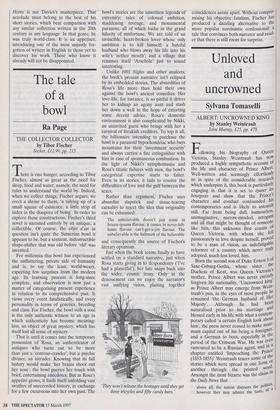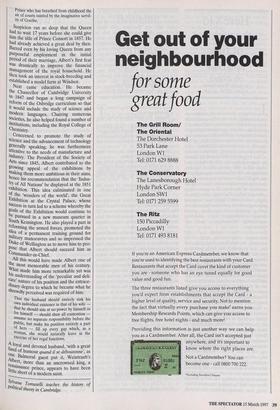Unloved and uncrowned
Sylvana Tomaselli
ALBERT: UNCROWNED KING by Stanley Weintraub John Murray, £25, pp. 478 Following his biography of Queen Victoria, Stanley Weintraub has now produced a highly sympathetic account of the life and character of Prince Albert. Well-written and seemingly effortlessly so in spite of the considerable research which underpins it, this book is particularly engaging in that it is set to epater les bourgeois and show that the Prince's character and conduct confounded his contemporaries and is likely to astonish still. Far from being dull, humourless, unimaginative, narrow-minded, arrogant and all that might be thought of someone like him, this unknown first cousin of Queen Victoria, with whom she fell passionately in love despite herself, proved to be a man of vision, an indefatigable reformer of a country which never truly adopted, much less loved, him. Born the second son of Duke Ernest I of Saxe-Coburg-Gotha, whose sister, the Duchess of Kent, was Queen Victoria's mother, Prince Albert was never entirelY, forgiven his nationality. 'Uncrowned long as Prince Albert may emerge from Wein- traub's pen, in the eyes of most people he remained 'the German husband of Her Majesty'. Although he had been naturalised prior to his marriage and blessed early in his life with what a contem- porary called 'a certain English look about him', the press never ceased to make maxi' mum capital out of his being a foreigner, and a German to boot, especially in the period of the Crimean War. He was even rumoured to be a Russian agent, and In 3 chapter entitled 'Impeaching the Prince (1853-1855)' Weintraub traces some of the stories which were spread in one form of another through the printed w°ru. • Amongst the most bizarre was the claim in the Daily News that
above all, the nation distrusts the however they may admire the taste, of politics, Prince who has breathed from childhood the air of courts tainted by the imaginative servil- ity of Goethe.
Suspicion ran so deep that the Queen had to wait 17 years before she could give him the title of Prince Consort in 1857. He had already achieved a great deal by then. Barred even by his loving Queen from any Purposeful employment in the initial period of their marriage, Albert's first feat was drastically to improve the financial management of the royal household. He then took an interest in stock-breeding and established a model farm at Windsor.
Next came education. He became the Chancellor of Cambridge University in 1847 and began a long campaign of reform of the Oxbridge curriculum so that it would include the study of science and modem languages. Chairing numerous societies, he also helped found a number of institutions, including the Royal College of Chemistry. Concerned to promote the study of science and the advancement of technology generally speaking, he was furthermore attentive to the needs of manufacture and industry. The President of the Society of Arts since 1845, Albert contributed to the growing appeal of the exhibitions by making them more ambitious in their aims, hence his recommendation that the 'Indus- try of All Nations' be displayed at the 1851 exhibition. This idea culminated in one of the 'wonders of the world', the Great Exhibition at the Crystal Palace, whose success in turn led to a scheme whereby the be of the Exhibition would continue to °e pursued in a new museum quarter in South Kensington. He also played a part in reforming the armed forces, promoted the idea of a permanent training ground for military manoeuvres and so impressed the Duke of Wellington as to move him to pro- Pose that Albert should succeed him as Commander-in-Chief.
All this would have made Albert one of the most memorable men of his century. What made him more remarkable yet was his understanding of the 'peculiar and deli- cate' nature of his position and the extraor- dinary degree to which he became what he shrewdly perceived was required of him: That the husband should entirely sink his own individual existence in that of his wife that he should aim at no power by himself or for himself — should shun all contention — assume no separate responsibility before the public, but make his position entirely a part of hers — fill up every gap which, as a Woman, she would naturally leave in the exercise of her regal functions.
A loyal and devoted husband, 'with a great end of humour quand it se deboutonne , as one Balmoral guest put it, Weintraub's A_ then, more than an uncrowned king, a renaissance prince, appears to have been little short of a modern saint.
8Ylvana Tomaselli teaches the history of political theory in Cambridge.



































































 Previous page
Previous page